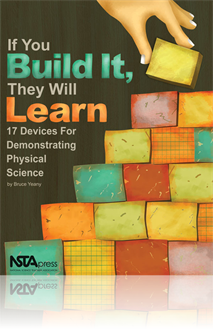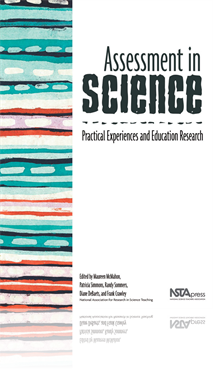All Resources
Book Chapter
Galileo's track is made from one long continuous rail that joins two different angled ramps together. The first ramp has a short, steep slope. After a ball rolls down the first ramp, it will then roll up a longer gently sloping part of the track on t...
Book Chapter
In the demonstration in this chapter, a person holds a large foam board and a small brass weight to compare their respective weights. After hefting both objects for a few moments, the person is asked to determine which is heavier. The obvious answer ...
Book Chapter
This chapter features small wooden or cardboard boxes that hang about 5 feet from the ceiling on a short length of string. A second string comes out of the bottom of the boxes. The purpose of the boxes is not immediately clear because the inner worki...
Book Chapter
Blowing up a balloon inside a bottle is difficult if there is no place for the air to be displaced. Once a balloon is blown up inside the bottle, the balloon remains blown up even with the mouth of the balloon wide open. The project in this chapter i...
Book Chapter
In this chapter, a board is set up with three surfaces. The students' hands compare the relative temperature of the surfaces on the board, and the board prompts students to investigate by asking them to determine which surface is coldest. After placi...
Book Chapter
In this chapter, the words "What color is inside?" appear around a hole on top of a can. The outside is multicolored, indicating that any of a number of colors could be inside. If students look through the hole, it appears that the inside is painted ...
Book Chapter
The device in this chapter shows how a thermostat works by turning a lightbulb on and off as the thermostat responds to the heat of the bulb. It can use a gum wrapper or a strip made from paper and aluminum foil to act as a thermostat mechanism. It b...
Book Chapter
This chapter focuses on the use of some very simple materials to produce an electric motor with which to demonstrate the principles of magnetism. A variation of the simple motor replaces the usual ceramic magnet with a coil of wire to form an electro...
Book Chapter
The principle of a lightbulb can be demonstrated without the danger of creating a vacuum inside a glass jar. One of the difficulties in demonstrating a lightbulb centers on the removal of air from the chamber using a vacuum pump. The device in this c...
Book Chapter
Tops are ancient toys that have been spinning around for thousands of years. Their movement—fascinating to watch—appeals to the child in all of us, and the action and the study of tops appeal to a wide range of age groups. Tops can be used for a ...
Book Chapter
Newton's first law of motion describes the resistance of an object to change in the speed and direction of its motion. The law also holds that objects will resist being put into motion. This concept is described as inertia. This free selection fro...
Book Chapter
Examples of resonance can be shown by using a variety of pendulum demonstrations. This chapter features a coupled pendulum and a Wilberforce pendulum. After observing the motion of the coupled pendulums or the Wilberforce pendulum, students can draw ...
Book Chapter
Hero of Alexandria, in about 62 AD, demonstrated that a small amount of water could be lifted to a point higher than its origin. This apparently contradicts that water can rise only to its own level. In this chapter, find out how a few soda bottles, ...
Book Chapter
String racers are an effective way to demonstrate Newton's third law. In this chapter, the instructions give plans for two types of string racers—the simple balloon racers that are quick and easy to build and a rubber band-powered propeller design ...
Book Chapter
The solar motor is an excellent way of demonstrating one method of changing solar energy directly into motion. For students to understand its operation, they need to understand some basic concepts. One is that matter can contract or expand due to tem...
Book Chapter
In this chapter, find out what a can of soda would feel like on other planets by altering the contents of several containers to simulate the change in surface gravity according to the various planets. This set of cans and a few other simple props can...
Book Chapter
This chapter provides the opportunity for students to observe the breakfast box sitting in plain view on a shelf, table, window ledge or in any other position that is remote enough to keep anyone from accidentally bumping against it. The box is unusu...
Book Chapter
A fossil is any evidence of an ancient organism. The remains of the body, such as bones, shells, leaf impressions, etc., are called body fossils. The evidence of animal activity, such as tracks, trails, and burrows, are called trace fossils. This cha...
Book Chapter
What Can You Learn From Fossils?
At one point or another, it seems like all students are interested in paleontology. Wonderful extinct animals like dinosaurs excite the imagination like almost nothing else. Once you have the students' interest, you will find that a study of paleon...
Book Chapter
Mass Extinction and Meteor Collisions With Earth
Paleontologists divide extinctions into two broad categories—background extinctions and mass extinctions. Background extinctions occur continuously while mass extinctions are unusual in that they involve very large numbers of species, of very diffe...
Book Chapter
How Are Fossils Collected and Prepared?
This chapter describes some ways that fossils are found and prepared and guides the reader though the steps of preparing real fossil specimens. Three activities are presented that focus on specific fossil collection and preparation techniques. Activi...
Book Chapter
How Can You Tell the Age of Earth?
In the activity in this chapter, a table of measurements is presented that can be used to construct a model of the age of Earth and some of the most important events in its history. The models are constructed out of a variety of materials—wooden bl...
Book Chapter
This chapter explores the methods of cladistics and facilitates an understanding of evolution through active learning. Four activities are presented that address the methods of tracing evolution in fossils and give examples of two well-documented evo...
Book Chapter
Diversity, Classification, and Taxonomy
This chapter places fossils in the contexts of their distribution on the globe and how we name them and quantify their communities. The activities analyze how diversity is measured, how dinosaurs are classified, and their distribution in time and spa...
Book Chapter
This chapter looks at fossils from a humanistic perspective. Fossil fuels—coal, oil, and natural gas—make up over 80% of our energy sources. They are called fossil fuels because they all come from ancient organic matter that has been buried and t...
Book Chapter
Whenever a fossil is beautiful, appealing, or is more than of ordinary significance, it may be called art. The first activity in this chapter challenges students to submit an entry on dinosaurs to a campus art contest for an outdoor art display. The ...
Book Chapter
A Knowledge-Based Framework for the Classroom Assessment of Student Science Understanding
Recent research in cognitive science linked with established principles of educational assessment provide a framework that science teachers and researchers can use to assess student understanding of science. Knowledge-based categories for assessing s...
Book Chapter
Evolving Ideas: Assessment in an Evolution Course
As science instruction moves from lectures that emphasize lists of facts to more student-centered approaches that emphasize knowledge generation and justification, it is clear that assessments must also change. The assessment instruments developed fo...
Book Chapter
Integrating an Assessment Plan Into A K—12/ University Engineering Partnership
A comprehensive assessment plan is a valuable component of a university’s K—12 outreach effort. The K—12 Engineering Outreach Initiative has integrated an assessment plan into each stage of its outreach—development, implementation, and sustai...
Book Chapter
Varying Instructional Methods and Assessment of Students in High School Chemistry
New content standards call for the implementation of new and varied pedagogical interventions and instructional techniques. An experimental project in which chemistry was taught using new pedagogical and assessment standards with 10th- to 12th-grade ...
Book Chapter
Performance Assessment Tasks as a Stimulus for Collaboration Among Preservice and Inservice Teachers
The Performance Assessment project was a collaboration initiated by a university team of instructors and a local school district in which inservice and preservice teachers developed and implemented science performance assessment tasks during a one-se...
Book Chapter
Assessment in Support of Contextually Authentic Inquiry
If research into the assessment of science learning is going to make a difference for teachers, it must be applicable to the realities of K—12 classrooms. This research study conducted in urban elementary schools focused on how students and teacher...
Book Chapter
Helping Students Understand the Minds-On Side of Learning Science
This collaboration between a fourth-grade teacher and university researcher resulted in the development of the Cognitive Strategies Inventory, an assessment instrument targeting writing, discussing, computing, reading, public speaking, and problem so...
Book Chapter
Revised Views of Classroom Assessment
The Classroom Assessment Project to Improve Teaching and Learning (CAPITAL), a collaborative research initiative between Stanford University and middle school science teachers in nearby school districts, examined classroom-based assessment in science...
Book Chapter
Moving Beyond Grades and Scores: Reconsidering Assessment Feedback
Many teachers are concerned about providing feedback to students in ways that support student learning. Five middle school teachers, part of the Classroom Assessment Project to Improve Teaching and Learning (CAPITAL), explored classroom-based assessm...
Book Chapter
Mind Mapping as a Flexible Assessment Tool
Mind mapping, a visual tool to improve note taking, foster creativity, organize thinking, and develop ideas and concepts, was the focus of this research project with middle school students. The efficacy of mind mapping as a teaching, learning, and as...
Book Chapter
Developing Assessment Items: A How-to Guide
Many current high-stakes accountability measures take the form of traditional test items. While traditional forms of assessment may not be the best method to assess all important skills and knowledge, teachers should learn how to construct these kind...
Book Chapter
Assessment in Support of Conceptual Understanding and Student Motivation to Learn Science
Classroom-based assessment strategies may influence the development of conceptual understanding and motivational beliefs among elementary learners in science. A contextual analysis of how young children (65 second graders) responded to classroom-base...
Book Chapter
“Adaptive inquiry” is the product of the synergistic relationship between what a student brings to the classroom, the teacher’s ability to shape a lesson in response to the needs of the student, and the method of final assessment. This new form...
Book Chapter
Science Standards Influence Classroom Assessment Practices
School districts and individual schools must place a premium on linking classroom instruction, science content standards, and classroom assessment. In this study, the authors examined the influence of national science standards on middle school scien...





